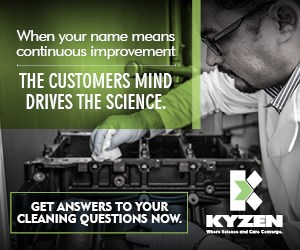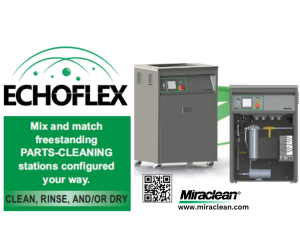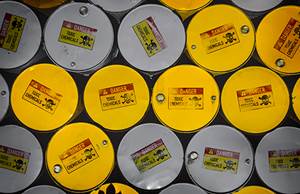MecWash Systems Finds Success in High-Quality Cleaning Standards, Environmental Conservation
For customers who demand the highest levels of cleanliness for their components, few companies are more sought after than MecWash Systems.
For customers who demand the highest levels of cleanliness for their components, few companies are more sought after than MecWash Systems. Since 1993, MecWash of Tewkesbury, United Kingdom, has been a leader in the construction of aqueous-based cleaning systems for the aerospace, hydraulics and precision machining industries. The people at MecWash Systems are experts in the process of cleaning machined parts, turned parts, stamped parts and extrusions. MecWash manufactures high-performance
cleaning systems and manufactures its own line of cleaning chemicals, so they understand all facets required to clean complicated parts to the highest degree of cleanliness. MecWash customers include some of the world’s most respected manufacturers, such as Rolls-Royce Aerospace, Goodrich (UTC Aerospace Systems) and Renishaw.
“When the cleanliness requirements for a component become very stringent and component geometries
are complicated, this is where we specialize,” says Bill Westbrook, North American operations manager. “Our systems provide excellent value to companies that require their parts to be absolutely free of all contamination, even down to the smallest micron sizes.”
While the company employs fewer than 50 people, its customer base stretches around the world. MecWash machines can be found on every continent and can clean components large to small, from 12-cylinder engine blocks all the way down to the smallest bearing needles. MecWash aqueous cleaning systems are automated. All cleaning takes place inside the system, which features rotational wash
and rinse processes, powerful ultrasonics to remove tough contaminants, hot air blow dry for bulk drying of parts and vacuum dry for the complete dryness of components with narrow-diameter blind holes.
Some of the features of MecWash’s cleaning systems include continuous rotation and flushing of all component surfaces, oil separation and in-line cartridge filtration to capture all contaminants removed in the cleaning process. After the components are cleaned, the combination of hot air and vacuum drying guarantee moisture is removed from all component surfaces, including small blind holes, internal
galleries and mating faces.
“While we do make cleaning systems without ultrasonics and vacuum dry, the majority of the machines we manufacture are high-performance systems that include these options,” Mr. Westbrook says. “Our customers tend to be companies that require the highest cleanliness standards and very specific cleaning results, day in and day out.”
Another competitive advantage for MecWash is its “Aqua-Save” technology. The MecWash Aqua-Save is MecWash Systems’ answer to remove emulsified lubricants from the wash and rinse waters. Where cutting oil is removed from the wash water through a MecWash oil separator, emulsified contamination such as water-soluble machine coolants are removed through an evaporative process in the Aqua-Save. For every 100 gallons of contaminated water evaporated through the Aqua-Save, more than 95 gallons
are condensed and returned back to the MecWash wash and rinse tanks as pure distilled water. This means that waste haul-away costs are minimized and city water use charges are substantially reduced.
With so many PMPA members in its key customer industries, MecWash Systems’ executives were immediately enthusiastic to join the association when first approached by Miles Free, PMPA’s director of research and technology. Technical members since 2010, Mr. Westbrook says his company makes great use of PMPA’s listserves, and he appreciates the openness between members to share and
assist each other when finding solutions in the field.
“It is fantastic that a member in, say Michigan, can post a question about machining a certain type of material and other members from all over the country, companies who might otherwise be competitors, then provide immediate and thorough responses,” Mr. Westbrook says. “Maybe PMPA has been able to develop such an effective, open forum because members don’t mention the end customers. It’s like having your own board of directors or special team of advisors to help you with your business any time you need it. It raises everybody’s game. I preach a bit to the choir here, but I talk up PMPA any time I am asked.”
Related Content
3 Common Filtration Questions Answered
Learn about the variety of filters for removing particulates from a cleaning fluid, how to determine cleaning fluid life and more.
Read MoreParts Cleaning Sector Shifts Energy Toward Regulatory Changes
With changes in EPA regulations regarding the use of some popular cleaning fluids, cleaning suppliers and end users are readjusting business strategies and/or cleaning processes to meet new requirements.
Read MoreKyzen Solvents Provide Safe Parts Cleaning
The SLV901 and SLV803 solvents are formulated to maintain cleaning efficacy while providing a safe, environmentally friendly alternative to processes that use PFAS and HFCs.
Read MoreIn-line Monitoring for Automated Immersion Cleaning Systems
Ecoclean’s Acoustic Performance Measurement (APM) system provides in-line measurement of ultrasonic frequency and power in fully automated immersion cleaning systems on a batch-by-batch basis or at defined time intervals, such as once a shift, day or week.
Read MoreRead Next
5 Aspects of PMTS I Appreciate
The three-day edition of the 2025 Precision Machining Technology Show kicks off at the start of April. I’ll be there, and here are some reasons why.
Read MoreDo You Have Single Points of Failure?
Plans need to be in place before a catastrophic event occurs.
Read MoreSeeing Automated Workpiece Measurement in Real Time
User-friendly inspection software for CNC machining centers was shown at IMTS 2024 monitoring measurements between and after machining while performing SPC based on recorded measurement values.
Read More





















